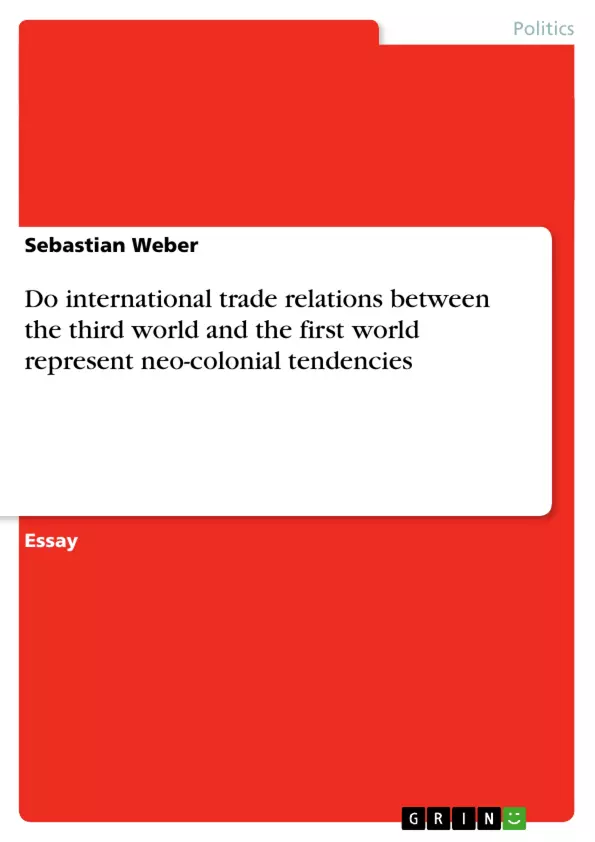With the decolonisation starting after World War II African countries became independent from their former European colonisers. While the process of achieving political independence is generally accepted as completed, economic independence remains uncertain.
There are various fields in which dependency on former colonisers can be observed.
Many African politicians and Non Governmental Organisations (NGOs) regard supra-international institutions like the World Bank, the International Monetary Fund (IMF) and the World Trade Organisation (WTO) as western dominated institutions, which impose their ideas of Politics and Economics on the so called “third world countries”. This can take place in forms of credits to African countries by the IMF. These credits are subject to “Structural Adjustment Programs” (SAPs) the receiving country has to implement. A SAP mainly focuses on the liberalisation of a country’s economy and thereby takes the country’s independence in choosing its own policies.
In the last twenty years NGOs, academics and politicians became aware of an emergent debate on a new world order in trade relations. By criticising the trade policy of developed countries, NGOs, such as Oxfam and Attac, accuse these countries of keeping the third world poor and dependent on the first world (Oxfam 2002). By subsidising the own economy and protecting it through tariffs, developed countries hinder the developing countries to increase exports and thereby national income. This essay focuses on this relationship between the third and the first world in international trade. It aims to prove the statement of the NGOs and thereby figure out whether there is a neo-colonial tendency in trade relations between the first and the third world) or not.
Inhaltsverzeichnis (Table of Contents)
- Introduction
- Neo-colonialism and its relevance for international trade
- Empirical analysis of the third world trade
- Development of the export and import structures of Sub-Saharan Africa
- Development of trade barriers in international trade
- The impact of the trade barriers on the export performance of Sub-Saharan Africa
- Theoretical background
- Free Trade
- Protectionism
- Conclusion
Zielsetzung und Themenschwerpunkte (Objectives and Key Themes)
The essay aims to examine the relationship between the third and the first world in international trade, specifically focusing on the trade policy of developed countries. It seeks to determine if there is a neo-colonial tendency in these trade relations.
- The concept of neo-colonialism and its influence on trade relations between developed and developing countries.
- The empirical analysis of third world exports, including the development of export and import structures and the presence of trade barriers.
- The impact of trade policy in developed countries on the export performance of third world countries.
- The theoretical perspectives of free trade and protectionism in international trade.
- The relationship between trade policies and the concept of neo-colonialism, focusing on the potential for economic dependence.
Zusammenfassung der Kapitel (Chapter Summaries)
- Introduction: The essay introduces the concept of neo-colonialism and its relevance to trade relations, specifically focusing on the role of international institutions like the World Bank, IMF, and WTO in shaping economic policies in developing countries.
- Neo-colonialism and its relevance for international trade: This chapter explores the term "neo-colonialism" and its implications for international trade. It examines how economic dependence on the West persists despite political independence, particularly through the influence of Western financial interests and the control of key resources.
- Empirical analysis of the third world trade: This chapter provides an empirical overview of Sub-Saharan Africa's export and import structures and performance from 1955 to 2000. It also analyzes the development of trade barriers, such as tariffs and non-tariff barriers, and their impact on export performance.
Schlüsselwörter (Keywords)
This essay focuses on international trade relations, neo-colonialism, third world countries, Sub-Saharan Africa, trade barriers, terms of trade, free trade, protectionism, and the economic dependency of developing countries on the West. The analysis draws upon the perspectives of international institutions, NGOs, and academics involved in development and trade issues.
Frequently Asked Questions
What is the main focus of this essay on international trade?
The essay examines whether trade relations between developed (First World) and developing (Third World) countries exhibit neo-colonial tendencies.
How is "neo-colonialism" defined in the context of trade?
It refers to a state of economic dependence where former colonizers or international institutions impose policies that hinder the true independence of developing nations.
What are "Structural Adjustment Programs" (SAPs)?
SAPs are economic policies imposed by the IMF on countries receiving credits, often requiring market liberalization, which critics argue reduces a country's sovereignty.
How do trade barriers impact Sub-Saharan Africa?
Developed countries often use subsidies and tariffs to protect their own economies, which prevents developing countries from increasing exports and national income.
What is the difference between Free Trade and Protectionism in this discussion?
Free trade is the theoretical ideal of open markets, while protectionism involves barriers used by developed nations that NGOs like Oxfam argue keep the Third World poor.
What regions are specifically analyzed in the empirical section?
The essay provides an empirical analysis of export and import structures specifically for Sub-Saharan Africa from 1955 to 2000.
- Quote paper
- Sebastian Weber (Author), 2003, Do international trade relations between the third world and the first world represent neo-colonial tendencies, Munich, GRIN Verlag, https://www.grin.com/document/43056



